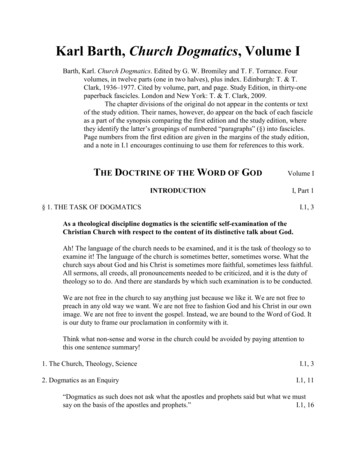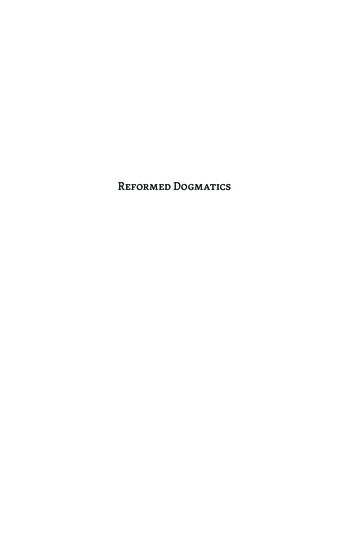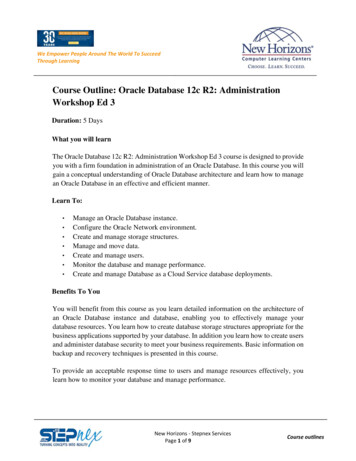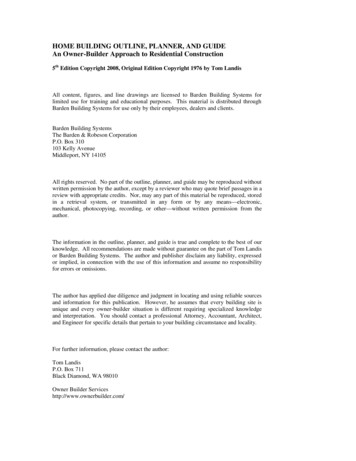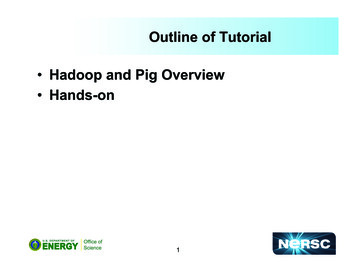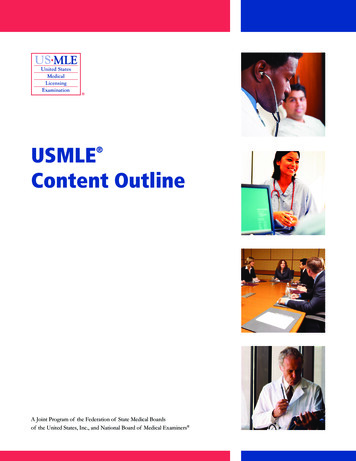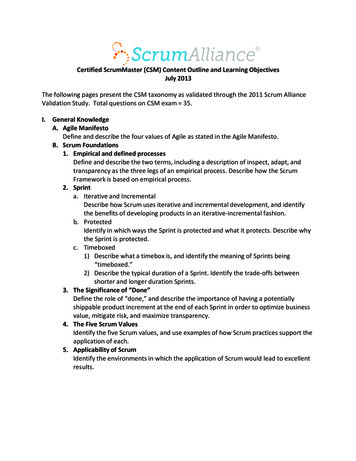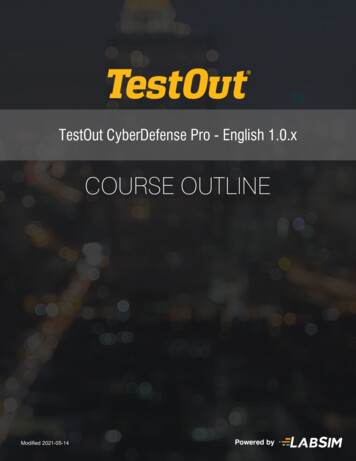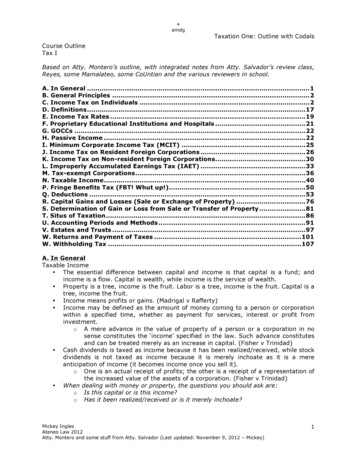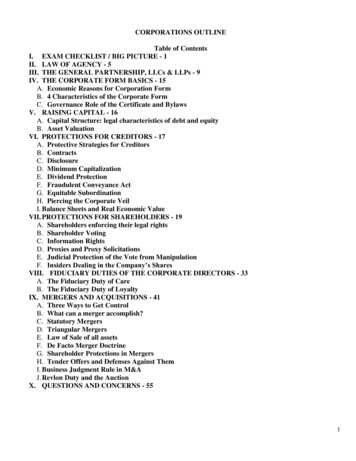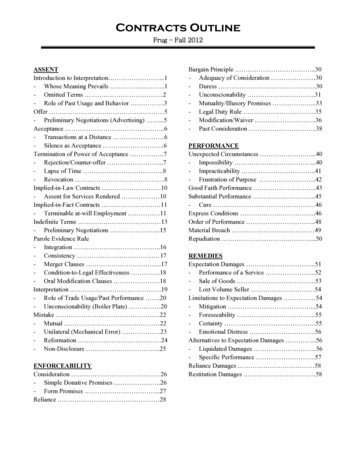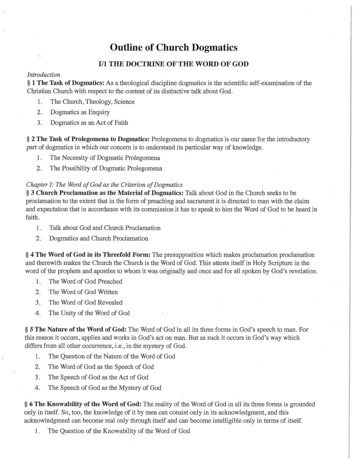
Transcription
Outline of Church DogmaticsI/1 THE DOCTRINE OF THE WORD OF GODIntroduction§ 1 The Task of Dogmatics: As a theological discipline dogmatics is the scientific self-examination of theChristian Church with respect to the content of its distinctive talk about God.1.The Church, Theology, Science2.Dogmatics as Enquiry3.Dogmatics as an Act of Faith§ 2 The Task of Prolegomena to Dogmatics: Prolegomena to dogmatics is our name for the introductorypart of dogmatics in which our concern is to understand its particular way of knowledge.1.The Necessity of Dogmatic Prolegomena2.The Possibility of Dogmatic ProlegomenaChapter I: The Word of God as the Criterion of Dogmatics§ 3 Church Proclamation as the Material of Dogmatics: Talk about God in the Church seeks to beproclamation to the extent that in the form of preaching and sacrament it is directed to man with the claimand expectation that in accordance with its commission it has to speak to him the Word of God to be heard infaith.1.Talk about God and Church Proclamation2.Dogmatics and Church Proclamation§ 4 The Word of God in its Threefold Form: The presupposition which makes proclamation proclamationand therewith makes the Church the Church is the Word of God. This attests itself in Holy Scripture in theword of the prophets and. apostles to whom it was originally and once and for all spoken by God's revelation.1.The Word of God Preached2.The Word of God Written3.The Word of God Revealed4.The Unity of the Word of God§ 5 The Nature of the Word of God: The Word of God in all its three forms in God's speech to man. Forthis reason it occurs, applies and works in God's act on man. But as such it occurs in God's way whichdiffers from all other occurrence, i.e., in the mystery of God.1.The Question of the Nature of the Word of God2.The Word of God as the Speech of God3.The Speech of God as the Act of God4.The Speech of God as the Mystery of God§ 6 The Knowability of the Word of God: The reality of the Word of God in all its three forms is groundedonly in itself. So, too, the knowledge of it by men can consist only in its acknowledgment, and thisacknowledgment can become real only through itself and can become intelligible only in terms of itself.1.The Question of the Knowability of the Word of God
2.The Word of God and Man3.The Word of God and Experience4.The Word of God and Faith§ 7 The Word of God, Dogma and Dogmatics: Dogmatics is the critical question about dogma, i.e., aboutthe Word of God in Church proclamation, or, concretely, about the agreement of the Church proclamationdone and to be done by man with the revelation attested in Holy Scripture. Prolegomena to dogmatics as anunderstanding of its epistemological path must therefore consist in an exposition of the three forms of theWord of God as revealed, written, and preached.1.The Problem of Dogmatics2.Dogmatics as a Science3.The Problem of Dogmatic ProlegomenaChapter II: The Revelation of God I Part 1. The Triune God§ 8 God in His Revelation: God's Word is God Himself in His revelation. For God reveals Himself as theLord.and accordmg to Scripture this signifies for the concept of revelation that God Himself in unimpairedunity yet also is unimpaired distinction is Revealer, Revelation, and Revealedness.1.The Place of the Doctrine of the Trinity in Dogmatics2.The Root of the Doctrine of the Trinity3.Vestigium TrinitatisThe God who reveals Himself according to Scripture is One in three distinctivemodes of being subsisting in their mutual relations: Father, Son, and Holy Spirit. It is thus that He is theLord, i.e., the Thou who meets man's I and unites Himself to this I as the indissoluble Subject and therebyand therein reveals Himself to him as his God.§ 9 The Triunity of God:1.Unity in Trinity2.Trinity in Unity3.Triunity4.The Meaning of the Doctrine of the Trinity§ 10 God the Father: The one God reveals Himself according to Scriptures as the Creator, that is, as theLord of our existence. As such He is God our Father because He is so antecedently in Himself as the Fatherof the Son.1.God as Creator2.The Eternal Father§ 11 God the Son: The one God reveals Himself according to Scripture as the Reconciler, i.e., as the Lord inthe midst of our enmity towards Him. As such He is the Son of God who has come to use or the Word of Godthat has been spoken to us, because He is so antecedently in Himself as the Son or Word of God the Father:1.God as Reconciler2.The Eternal Son
§ 12 God the Holy Spirit: The one God reveals Himself according to Scripture as the Redeemer, i.e., as theLord who sets us free. As such He is the Holy Spirit, by receiving whom we become the children of God,because, as the Spirit of the love of God the Father and the Son, He is so antecedently in Himself.1.God as Redeemer2.The Eternal SpiritI/2 THE DOCTRINE OF THE WORD OF GOD ,Chapter II: The Revelation of God I Part 2. The Incarnation of the Word§ 13 God's Freedom for Man: According to Holy Scripture God's revelation takes place in the fact thatGod's Word became a man and that this man has become God's Word. The incarnation of the eternal Word,Jesus Christ, is God's revelation. In the reality of this event God proves that He is free to be our God.1.Jesus Christ the Objective Reality of Revelation2.Jesus Christ the Objective Possibility of Revelation§ 14 The Time of Revelation: God's revelation in the event of the presence of Jesus Christ is God's time forus. It is fulfilled time in this event itself. But as the Old Testament time of expectation and as the NewTestament time of recollection it is also the time of witness to this event.1.God's Time and our Time2.The Time of Expectation3.The Time of Recollection§ 15 The Mystery of Revelation: The mystery of the revelation of God in Jesus Christ consists in the factthat the eternal Word of God chose, sanctified and assumed human nature and existence into oneness withHimself, in order thus, as very God and very man, to become the Word of reconciliation spoken by God to·man. The sign of this mystery revealed in the resurrection of Jesus Christ is the miracle of His birth, that Hewas conceived by the Holy Ghost, born of the Virgin Mary.1.The Problem of Christology2.Very God and Very Man3.The Miracle of ChristmasChapter II: The Revelation of God I Part 3. The Outpouring of the Holy Spirit§ 16 The Freedom of Man for God: According to Holy Scripture God's revelation occurs in ourenlightenment by the Holy Spirit of God to a knowledge of His Word. The outpouring of the Holy Spirit isGod's revelation. In the reality of this event consists our freeoom to be the children of God and to know andlove and praise Him in His revelation.1.The Holy Spirit the Subjective Reality of Revelation2.The Holy Spirit the Subjective Possibility of Revelation§ 17 The Revelation of God as the Abolition of Religion: The revelation of God in the outpouring of theHoly Spirit is the judging but also reconciling presence of God in the world of human religion, that is, in therealm of man's attempts to justify and to sanctify himself before a capricious and arbitrary picture of God.The Church is the locus of true religion, so far as through grace it lives by grace.1.The Problem of Religion in Theology2.Religion as Unbelief
3.True Religion§ 18 The Life of the Children of God: Where it is believed and acknowledge in the Holy Spirit, therevelation of God creates rnen who do not exist without seeking God in Jesus Christ, as who cannot cease totestify that He has found them.1.Man as a Doer of the Word2.The Love of God3.The Praise of GodChapter III: Holy Scripture§ 19 The Word of God for the Church: The Word of God is God Himself in Holy Scripture. For God oncespoke as Lord to Moses and the prophets, to the Evangelists and apostles. And now through their writtenword He speaks as the same Lord to His Church. Scripture is holy and the Word of God, because by the HolySpirit it became and will become to the Church a witness to divine revelation.1.Scripture as a Witness to Divine Revelation2.Scripture as the Word of God§ 20 Authority in the Church: The Church does not claim direct and absolute and material authority foritself but for Holy Scripture as the Word of God. But actual obedience to the authoritative Word of God inHoly Scripture is objectively determined by the fact that those who in the Church mutually confess anacceptance of the witness of Holy Scripture will be ready and willing to listen to one another in expoundingand applying it. By the authority of Holy Scripture on which it is founded, authority in the Church isrestricted to an indirect and relative and formal authority.1.The Authority of the Word2.Freedom under the Word§ 21 Freedom in the Church: A rnernber of the Church claims direct, absolute and material freedom not forhimself, but only for Holy Scripture as the Word of God. But obedience to the free Word of God in HolyScripture is subjectively conditioned by the fact that each individual who confesses his acceptance of thetestimony of Scripture must be willing and prepared to undertake the responsibility for its interpretation andapplication. Freedom in the Church is limited as an indirect, relative and formal freedom by the freedom ofHoly Scripture in which it is grounded.1.The Freedom of theWord/2.Freedom under the WordChapter IV: Proclamation of the Church§ 22 The Mission of the Church: The Word of God is God Himself in the proclamation of the Church ofJesus Christ. In so far as God gives the Church the cornrnission to speak about Hirn, and the Churchdischarges this commission, it is God Himself who declares His revelation in His witnesses. Theproclamation of the Church is pure doctrine when the human word spoken in it in confirmation of the biblicalwitness to revelation offers and creates obedience to the Word of God. Because this is its essential character,function and duty, the word of the Church preacher is the special and irnrnediate object of dogmatic activity.1.The Word of God and the Word of Man in Christian Preaching2.Pure Doctrine as the Problem of Dogmatics3.Dogmatics as Ethics
§ 23 Dogmatics as a Function of the Hearing Church: Dogmatics invites the teaching Church to listenagain to the Word of God in the revelation to which Scripture testifies. It can do this only if for its own part itadopts the attitude of the hearing Church and therefore itself listens to the Word of God as the norm to whichthe hearing Church knows itself to be subject.1.The Formal Task of Dogmatics2.The Dogmatic Norm§ 24 Dogmatics as a Function of the Teaching Church: Dogmatics summons the listening Church toaddress itself anew to the task of teaching the Word of God in the revelation attested in Scripture. It can dothis only as it accepts itself the position of the teaching Church and is therefore claimed by the Word of Godas the object to which the teaching Church as such has devoted itself.1.The Material Task of Dogmatics2.The Dogmatic Method11/1THE DOCTRINEOF GODChapter V: The Knowledge of God§ 25 The Fulfillment of the Knowledge of God: The knowledge of God occurs in the fulfillment of theIrevelation of His Word by the Holy Spirit, and therefore in the reality and with the necessity of faith and itsobedience. Its content is the existence of Hirn whom we must fear above all things because we may love Hirnabove all things; who remains a mystery to us because He Himself has made Himself so clear and certain tous.1.Man before God2.God before Man§ 26 The Knowability of God: The possibility of the knowledge of God springs from God, in that He isHimself the truth and gives Himself to man in His Word by the Holy Spirit to be known as the truth. Itsprings from man, in that, in the Son of God by the Holy Spirit, he becomes an object of the divine goodpleasure and therefore participates in the truth of God.1.The Readiness of God2.The Readiness of Man§ 27 The Limits of the Knowledge of God: God is known only by God. We do not know Hirn, then, invirtue of the views and concepts with which in faith we attempt to respond to His revelation. But we also donot know Him without making use of His permission and obeying His command to undertake this attempt.The success of this undertaking, and therefore the veracity of our human knowledge of God, consists in thefact that our viewing and conceiving is adopted and determined to participation in the truth of God by GodHimself in grace.1.The Hiddenness of God2.The Veracity of Man's Knowledge of GodChapter VI: The Reality of God§ 28 The Being of God as the One who Loves in Freedom: God is who He is in the act of His revelation.God seeks and creates fellowship between Himself and us, and therefore He loves us. But He is this lovingGod without us as Father, Son and Holy Spirit, in the freedom of the Lord, who has His life from Himself.
1.The Being of God in Act2.The Being of God as the One who loves3.The Being of God in Freedom§ 29 The Perfections of God: God lives His perfect life in the abundance of many individual and distinctperfections. Each of these is perfect in itself and in combination with all the others. For whether it is a formof love in which God is free, or a form of freedom in which God loves, it is nothing else but God Himself,His one, simple, distinctive being.§ 30 The Perfections of the Divine Loving: The divinity of the love of God consists and confirms itself inthe fact that in Himself and in all His works God is gracious, merciful and patient, and at the same time holy,ri hteous and wise.1.The Grace and Holiness of God2.The Mercy and Righteousness of God3.The Patience and Wisdom of God§ 31 The Perfections of the Divine Freedom: The divinity of the freedom of God consists and confirmsitself in the fact that in Himself and in all His works God is One, constant and eternal, and therewith alsoomnipresent, omnipotent and glorious.1.The Unity and Omnipresence of God2.The Constancy and Omnipotence of God3.The Eternity and Glory of God11/2THE DOCTRINE OF GODChapter VII: The Election of God§ 32 The Problem of a Corr
Outline of Church Dogmatics I/1 THE DOCTRINE OF THE WORD OF GOD Introduction § 1 The Task of Dogmatics: As a theological discipline dogmatics is the scientific self-examination of the Christian Church with respect to the content of its distinctive talk about God. 1. The Church, Theology, Science 2. Dogmatics as Enquiry 3. Dogmatics as an Act of Faith
